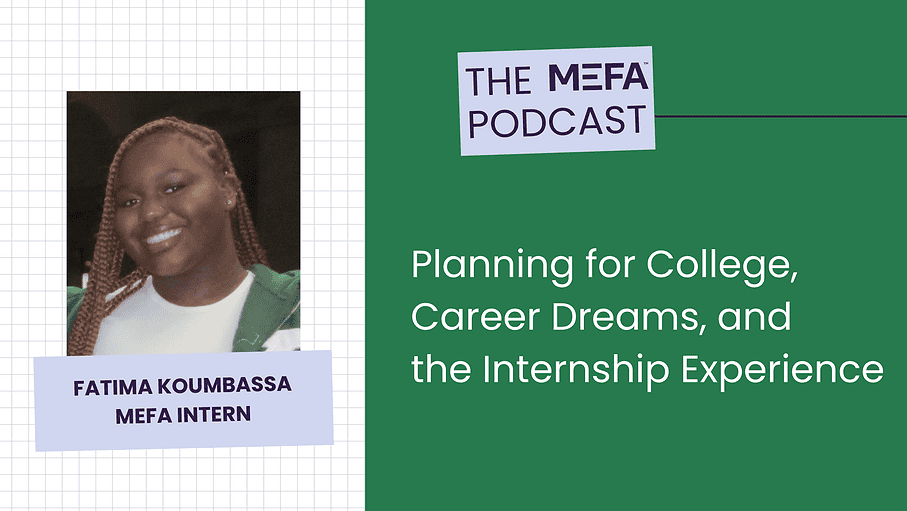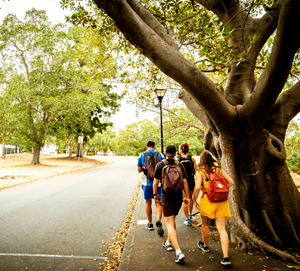Resources Mentioned in this Episode
Fatima Koumbassa: [00:00:00] Not everything is given to you. You have to go out there and get it done. So the scholarships are not going to apply for themselves. You have to, do your research. You have to do research definitely search up different stuff, talk to different people. Never feel like you’re alone or you feel like some people won’t understand. There’s a lot of people who have went through a lot before going out to college and figuring out what they want to do. So whether it’s listening to a podcast, reading different articles about, not the struggles of going to college, just hearing other perspectives on things, it’ll be very good for you.
Jonathan Hughes: Hi everyone and welcome to the Mefa Podcast. My name is Jonathan Hughes and Nat was one of the guests on our show today. High school Senior Fatima Koumbassa. Let me back up for a minute here and describe what you’re going to hear and if you’re [00:01:00] watching see on the show today. So MEFA has for many years partnered with Fatima’s High School, Cristo Rey, which is the school in Boston, with a special feature of what it calls its corporate work study program.
And through this program, MEFA has been lucky enough to host Cristo Rey students as interns. And it’s been a great experience for us because. We get to work with high school students and perhaps give them a taste of what it’s like to work in an office environment. We get to know them and utilize their talents and their skills and their interests, and oftentimes we get to have contact with them as is the case with Fatima as they’re preparing for their plans after high school.
And so that often includes things like college applications and college searches and filing financial aid forms. So hopefully, in addition to getting the students acquainted with the business world, so to speak, we may be able to be a resource for them in their [00:02:00] search, but they’re also definitely a resource for us.
They give us a firsthand account of what it is like for students to be going through this college application. And decision process. So just as we get to do that, so will you. We’ll talk to Fatima about her plans for college and her experience of going through the college application and decision process, and we’ll talk to her about her internship at MEFA.
We’ll also hear from Fatima’s internship coordinator at Cristo Rey Jessina Baker about the corporate work study program at Cristo Rey, what the benefits are for students and businesses, and generally how it works. I’ll break in when that happens, but now let’s meet our first guest on the show.
Fatima Koumbassa: Hi, my name is Fatima Koumbassa.
I’m a senior at Cristo Rey Boston High School. I am born and raised in Boston and I am an intern at MEFA. My plans are [00:03:00] to, fingers crossed, my plans are to go to Catholic University in DC for social work.
Jonathan Hughes: And has it always been the plan to go to college?
Fatima Koumbassa: Definitely it’s always been my plan to go to college, to go to Catholic University.
No, I did want to go to an HBCU in Atlanta Spelman College, but, things changed. And I switched my major around and I found out that Catholic University, which was introduced to me by one of my math teachers my. No, last year actually he is an alum and he introduced me to the school and told me that I had a really good social work program and had a really good like school of social work type of thing going on.
Jonathan Hughes: So you said you changed your major, you had a different idea originally. What was it?
Fatima Koumbassa: Originally I wanted to be an actress, so I wanted to do theater and art that type of stuff. I. Did have like somewhat of a, it was a job, but it was also more of a nice program, like workshops my freshman year of high [00:04:00] school, which allowed me to be able to be in plays.
I did a lot of plays during that time. We did a lot of like improv and just certain like acting, like workshops that really, made me think I really wanted to. Be an actor for the rest of my life, but I think I just accepted the fact that it might just be a hobby.
Jonathan Hughes: And so what pointed you towards social work?
Fatima Koumbassa: I don’t know. So I feel like for me personally, I. I just felt yes, I do enjoy because I love movies. I do enjoy movies. Like I can do that all day and I do love acting and all that stuff. But there was something in me that kind of just was pushing that, hey, like I don’t think this is generally what you wanna do for the rest of your life.
I don’t think this is your true calling. It’s something that you enjoy, but is this like your life? And I’ve always known that. I love to give back. I love helping others and stuff like that. So I was, [00:05:00] digging into what that could be professionally as a job and social work is what it came out to be.
Jonathan Hughes: So you mentioned the math teacher that recommended Catholic University to you. Were there any other mentors or examples or role models that you had during your college search?
Fatima Koumbassa: Definitely my college counselor Ms. Rato, Debbie Rato. Sorry. She was amazing. She’s always helped because honestly, I changed my mind a lot, so she’s always been with me to she’s never been the type to like.
Not downplay my options or my choices, but she’s always been there to support me, but also correct me and bring me back to reality when sometimes I get a little over myself. She’s been amazing through this entire journey and she’s been very patient with me, and that’s one of the people who definitely has helped me [00:06:00] through.
Jonathan Hughes: That’s awesome. That’s really great. So I want to talk about the actual college search and how did that process begin for you?
Fatima Koumbassa: Honestly, my college counselor made it somewhat easy for me. I had ideas on what school I wanted.
I somewhat had an idea of what schools I wanted to go to, based on my GPA and stuff like that, my college counselor was able to create suggestions for me, put it in like a Excel sheet, and then just tell you my options, which was which ones matches and stuff like that.
But, as you’re hearing what other schools people are having. I just start searching like, Hey, like what schools are best for social work and stuff like that. And then also too, because of my math teacher, like Catholic was definitely put on my list, asking teachers, Hey, what college did you go to?
What did you go to college for? Like, how did you enjoy it? Just stuff like that. I think that’s how the college process came out to be for me.
Jonathan Hughes: That’s awesome. That’s really nice. I don’t remember doing that [00:07:00] to my high school.
Fatima Koumbassa: There was a point in time where I just, honestly, I didn’t know what my major, what I wanted my major to be, what college I wanted to go to.
It was junior year, junior year is always the best. Worst year. Sorry. So I was just like in a, I was just blank, and I felt like. Yeah, I can ask people who I’m friends with, like my age, but you guys haven’t went to college yet, so it’s just I don’t know. I needed to ask someone who’s already been through that path, knows what it is.
So definitely going to the teachers, anybody, honestly, any adult, my siblings, just asking them like, Hey, what college did you want to go to? Like how is it being at college? And how did you know that this was the school for you? My sister actually went to Holy Cross. So I de she went during Covid, which was cut short, but she still had an experience.
She really liked it. My older cousin, who is like a big sister to me as well, she went to Bentley. She really liked it over there. My brother, he had went, he switched. Schools around. He went to I, I believe, American International [00:08:00] College in Springfield, and then he switched over to UMass Boston, which he really liked as well.
And then my other older brother slash cousin, he went to UMass Dartmouth, and he also liked it.
Jonathan Hughes: What were some of the things that you were looking at when you were looking at colleges? I know social work is part of it, but even before social work, what would put a college on your list?
Fatima Koumbassa: Honestly, I do not want to stay in state, like Massachusetts is not for me, so definitely it was.
The area, like the city I’m going to be in, I love Atlanta, Georgia. My cousin actually goes to Spelman, which was why I actually really wanted to go. But I loved Atlanta and I visited a couple times. So when, I’m falling in love with the city, Spelman just came up to my choice. But then. My sister had moved to dc, visited her.
I loved dc, and then when I found out that Catholic University was in DC it just all aligned for me. So for me, like yes, it’s like the school and what the school offers, but it’s also the area.
Jonathan Hughes: So how many colleges did you [00:09:00] actually apply to?
Fatima Koumbassa: I had applied to, I think 11 schools.
Jonathan Hughes: Was there a mixture of different costs and different types and things like that?
Fatima Koumbassa: So somewhat so the way my school does it, like the college counseling, they don’t want you to not apply to school because it’s too much, or it’s oh, apply to school. Because it’s like you don’t have to pay that much. But they do it based off of like financial stuff. So there was some schools where it was expensive, aid and scholarships, they always pushed that for us, grants and stuff like that.
So there was a mixture of both. It was like once you got your financial aid, you would go then into the calculator and put in the information and stuff like that, and then that’s how we would be able to see
Jonathan Hughes: and was cost a part of the discussion.
Fatima Koumbassa: Yes, definitely we do have to put all of our financial aid packages, do the calculations, and we do have to compare and contrast which would be better for you or your family to be able to pay [00:10:00] off and stuff like that.
So definitely it plays a part.
Jonathan Hughes: Did you do any scholarship searches, outside scholarship searches or applications while you were applying to college?
Fatima Koumbassa: Yes. I feel like I did start a little late on my scholarships search, but Common App does have a section where they do give out scholarships based on the information that you put in your comment app profile.
So just going in there and just searching. Not really searching, but just applying to whatever list that they give me that matches is what I did. I actually had applied for the Sist Bowman scholarship which they partner up with certain schools. Catholic University is one of the schools.
But they partner up with certain schools and basically, I guess they just, they match whatever, or they try to match whatever the school like, gives you. And then just helping you like. Close in that gap with your tuition. So that’s very good. I am still waiting on that. [00:11:00]
Jonathan Hughes: Okay. Now I want to talk about financial aid applications. Did you file a FAFSA?
Fatima Koumbassa: Yes.
Jonathan Hughes: Yes I did. Did you have to file a CSS profile?
Fatima Koumbassa: No.
Jonathan Hughes: So what was your experience then, doing the FAFSA? How easy or difficult did you find it?
Fatima Koumbassa: For me, FAFSA was very easy. I’ve heard a lot of stories about FAFSA. Sometimes FAFSA, like something happens to the website, something just always happens with FAFSA.
But this year it was very easy and, all college counselors was hands on deck, making sure that students were going through a very easy, experience and process with the whole situation. So for me it wasn’t that bad. And apparently they take the information straight from. I guess the government.
So it was very easy this year for me.
Jonathan Hughes: Okay. So you did your financial aid applications, you have your financial aid offers, you’re looking through all your offers. How do you make that decision, and not just the offers, but how do you make the decision of where you’re going to [00:12:00] go?
Fatima Koumbassa: There are some offers still loading, so I don’t know yet.
I don’t know yet at all. That is a meeting that I will be having soon. The time is taking May 1st is definitely coming up, but right now I. I’m having good faith that the sister Thea Bowman scholarship will come through and I’ll be able to go to Catholic.
Jonathan Hughes: And if it doesn’t happen with Catholic, then what is the backup?
Fatima Koumbassa: Bridgewater. Bridgewater university. I actually went to visit there, I believe, last week. Amazing campus. I absolutely loved it. Bridgewater also too, has a really good social work program. In Massachusetts, so I’ve heard a lot of great things about that.
Jonathan Hughes: What other campus visits did you make?
Fatima Koumbassa: I did Bridgewater State, I did UMass Boston. I had did Emanuel College. I didn’t apply to that school, but my friends did. But it would’ve been a great opportunity for us to go visit the college. I did Salem State University. I had did UMass. Amherst and a Catholic. I’m going to visit my spring break.
Jonathan Hughes: And not to introduce this thought, but do you [00:13:00] think that your plans might change while you’re in school?
Fatima Koumbassa: I have no idea. Everyone has been telling me that, when you get to college, you’re most likely gonna change that major and. I don’t know. I guess I’ll wait, but right now I’m pretty confident that I’m not going to, but knowing me, my mind will probably change.
Jonathan Hughes: Thinking about maybe a incoming junior who’s just going to be starting this process that you are near the end of now, what would you say to somebody in that position? What’s something that you wish you knew then that you know now
Fatima Koumbassa: your junior year is your very it’s the most important year of high school. I heard that and for me, sadly it went out one year and came out the other. But your junior year is very important. Advice I would give to a junior is you do have to be patient.
You have to be patient. But you also do have to understand that not everything is given to you. You have to go out there and get it done. [00:14:00] So the scholarships are not going to apply for themself. You have to, do your res, you have to do research definitely search up different stuff, talk to different people.
Never feel like you’re alone or like you feel like some people won’t understand. There’s a lot of people who have went through a lot before going out to college and figuring out what they want to do. So whether it’s listening to a podcast, reading different articles about. Not the struggles of going to college, just hearing other perspectives on things.
It’ll be very good for you.
Jonathan Hughes: I guess we can pivot now and start talking about your internship at MEFA. Can you talk a bit about the program and how long you’ve been at MEFA?
Fatima Koumbassa: I’ve been at MEFA for about, I think seven months. So the internship, I am able to get the background stuff of MEFA Pathway, so I’m able to go in and search in new internships.
Stuff and update them and, create new ones, find out new ones, scholarships as well, setting that up, helping out helping out [00:15:00] some, designing certain pages on the MEFA Pathway making. I actually did two interviews. I did an interview with my mental health counselor at my high school, and I also did one with.
Three wonderful DCF workers. Just how did they start out and hearing their perspective coming from college out of college and figuring out the career that they’re out that they are at now. I also did like flyers for MEFA Pathway, FAFSA aid help, and MASFA as well. Putting that all over around my school. Posters, boards that you can keep in the college counseling office.
Jonathan Hughes: And what was your favorite thing that you did?
Fatima Koumbassa: My favorite had to be the DCF workers just because I do want to go into social work. So just hearing how they started out, and they did an amazing job, honestly, explaining like almost every stage that you have to.
Kind of go through to get where they are now. So they were being very helpful. They gave me a different [00:16:00] perspective on the job. And it was amazing.
Jonathan Hughes: So the interview with them was about being a DCF worker?
Fatima Koumbassa: Yeah. So basically where they went to school, how did they know that they wanted to be a social worker, DCF worker certain battles they went through, how did they overcome it?
Certain situations and just giving out advice, honestly. Very beneficial.
Jonathan Hughes: Do you think that you’ve been able to share your interest or experience with Mifa in a way that makes us say, oh, let’s do that?
Fatima Koumbassa: Yeah. Honestly, I feel like I. Me just expressing how much I wanna be a social worker. And Jennifer and Aila and everybody else and the rest of the team were able to help me get these interviews set, especially with the DCF workers.
It wouldn’t have been possible without them. And yeah.
Jonathan Hughes: That’s awesome. Thank you so much.
Fatima Koumbassa: Thank you.
Jonathan Hughes: Alright, thank you so much Fatima. And now as promised, Jessina Baker, Fatima’s coordinator, stopped by the office to have a brief chat with us about the program. So let’s meet her.
Jessina Baker: My name [00:17:00] is Jessina Baker. I currently work at Cristo Rey Boston High School as a relationship manager.
The corporate work study program acts as the cornerstone of. Krista Boston. It supports students through internships like MEFA and allowing students to build on their soft skills and their hard skills Also it allows students to get that real world experience that couples well with our rigorous academics.
I think it’s very important when students are able to talk about. Being able to intern for four years in high school and how that transfers into whatever they decide to pursue after, whether it be college, whether it be to jump right into their career aspirations or to take a break. I think the corporate work study program allows students really figure out.
What is next for them. And I think our academics couples well with that as well.
Jonathan Hughes: And so is this open to all grade levels or is this just juniors and seniors?
Jessina Baker: So it’s actually all grade levels. Ninth graders have a specific [00:18:00] workday on Mondays. Seniors work on Tuesdays. Sophomores work on Thursdays, and juniors work on Wednesdays.
And it kind of rotates each year. And depending on the partner and. What days they want students to come in. We match the partner’s needs and the students’ needs to be able to create a successful internship. We have about over a hundred different partners. Some are nonprofits and others are paid partnerships.
But we try to balance that out through the nonprofits and our paid partnerships.
Jonathan Hughes: And what makes a good partnership?
Jessina Baker: I think the biggest thing that. As a school and as an organization that we look for in companies is the willingness to want to mentor our students. I think that’s the biggest component.
Obviously there’s other things that go into that, whether they have the capacity to do so or if they have the tasks for our students. But I think the biggest thing is wanting to work with high school students who come from a marginalized group of communities and want to serve them [00:19:00] and allow them to grow.
Jonathan Hughes: What about from the student end?
Jessina Baker: We actually do a couple of different surveys. So actually around this time we send out an end of the year survey where we try to gather students’ feedback and whether they want to return or not. And we also ask about their interests, which we implement into our Salesforce database, which then uses different algorithms to match what the student wants and what.
The company needs. And we use that as one of our starting points. But then we also reach out independently to different partners and our students and match their interests and what they’re currently into in the moment. They’re high schoolers, so sometimes they change their mind a lot, but I feel like it ends up working out because students really are interested in medical or legal and they stick to it, but sometimes we get some fluctuation there.
Jonathan Hughes: And so once the student is in that position, what’s the process of the relationship like between the student? Christo Ray and the employer or the [00:20:00] organization, what’s that like?
Jessina Baker: One of the biggest things I think about when monitoring that relationship is our timecard system.
So the Salesforce system that I mentioned spits out these time cards for each day for our students, and where we allow our students to give feedback about what they did and be able to refer. Reflect. And then we also allow our supervisors to reflect on the student’s work that day and offer any praise or constructive feedback that they might want to give.
We also have a score system, so it ranges from one to five, one being that they’re not meeting expectations, and five being that they exceed expectations. And our supervisors also use that timecard feedback to be able to give a student a score for the day. We also do check-ins. I personally do monthly check-ins with my students.
I love trying to just catch them and see if they need anything. But I also leave the door open if they ever need to ask me a question, if they never need to reach me. I’m always available teams via email, via phone whatever platform they feel [00:21:00] comfortable with. We also have. Two other surveys that we send out to our supervisors.
One kind of in the middle of the year, which is our mid-year survey, which gives the supervisor and the team a place to also reflect and if we need to make any improvements or if students are doing awesome, we also praise students there. And then we have the end of the year survey for supervisors, which is going to come out about this time.
And they also reflect and decide if they want their student to return or if they want to try something new.
Jonathan Hughes: What sense do you get from the students about how much they enjoy it or what they get out of it?
Jessina Baker: I think, I truly believe that students really enjoy the internship program, especially when we’re able to match them with their interests.
Sometimes it’s not a perfect match and we. Adjust and we were flexible. But overall, I believe students really enjoy this internship program. And I can attest to that as an alum of the program, that this is very [00:22:00] rewarding in both aspects, whether it be professional development or academics.
I think students really. Find it rewarding and they even come to the corporate work study office for after school initiatives and summer initiatives. So I believe that they really do take something very rewarding from this.
Jonathan Hughes: So what was your experience then, if I can ask? You said l. Not just of the program, right?
Jessina Baker: Yeah. So I graduated in 2019. My first year I worked at the Catholic Schools Foundation, where I learned basic office etiquette and learning about copying and scanning and just those basic things. And then for the next three years, I internship at Jones Kelleher. Which was a medical malpractice in construction firm.
And I got to do a lot of different things such as networking. I got to meet the mayor at the time at Rhode Island. I also got to sit in depositions, and I got to set up the law firm for whatever they [00:23:00] were bringing into to the company. So it was very interesting to get my foot in the door into the legal world and understand from.
The bottom up, how you grow and become an attorney. So that was really an interesting experience and really sticks with me even to this day.
Jonathan Hughes: Thank you so much.
Jessina Baker: Thank you.
Jonathan Hughes: All right. That was our show. Everyone. I want to thank. Our guests on the show today, Fatima and Jessica, it was a real pleasure to speak with you, and I really appreciate you sharing your time and your experience with everyone. Best of luck to you and folks. If you liked what you heard today and you want to know more from us on planning, saving, and paying for college and career readiness, then please follow the show and you can do that wherever you find your podcast and leave us a review.
That’s good. Hopefully a good one. It helps us to keep doing what we’re doing and [00:24:00] getting the show out to folks like you. I’d like to thank our producer, Shaun Connolly. I’d like to thank, I’d like to thank AJ Yee, Meredith Clement, Lauren Danz, Lisa Rooney, and Christina Davidson for their assistance in getting the show posted.
Once again, my name is Jonathan Hughes, and this has been the MEFA Podcast.












